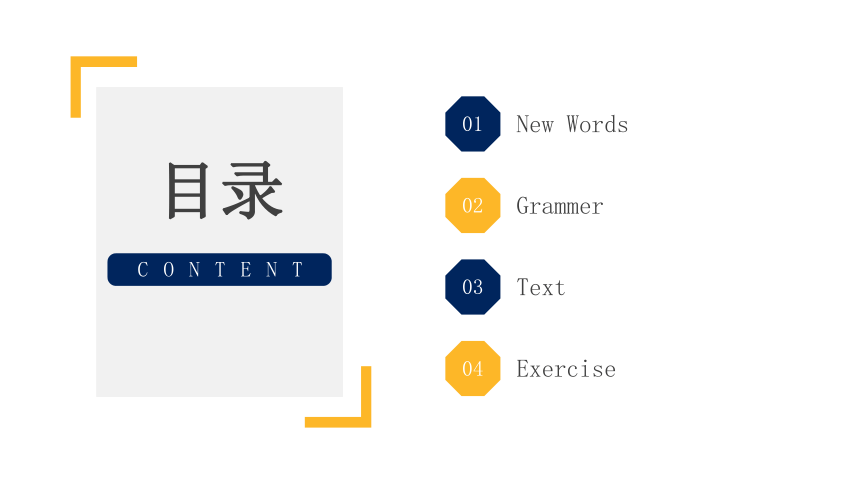Lesson12 Goodbye and good luck(课件)新概念英语第二册
文档属性
| 名称 | Lesson12 Goodbye and good luck(课件)新概念英语第二册 |  | |
| 格式 | pptx | ||
| 文件大小 | 64.3MB | ||
| 资源类型 | 试卷 | ||
| 版本资源 | 新概念英语 | ||
| 科目 | 英语 | ||
| 更新时间 | 2024-06-07 22:05:40 | ||
图片预览







文档简介
(共19张PPT)
入门考
n.行为,举止
v.应得到,值得
n.律师
n.银行
n. 工资
adv. 立刻
Goodbye and good luck
NEW CONCEPT ENGLISH 2
Lesson 12
Mona
目录
CONTENT
01
New Words
02
Grammer
03
Text
04
Exercise
New words
PART 01
New words
luck n.运气,幸运
captain n. 船长
sail v. 航行
harbour n.港口
proud adj.自豪
important adj.重要的
Grammer
PART 02
1.luck n. 运气,幸运
lucky adj. 幸运的
unlucky adj.不幸的
luckily adv. 幸运地
unluckily adv. 不幸地
good luck 祝你好运/一切顺利/一路顺风
lucky dog 幸运儿
eg:People generally believe that seeing a rainbow brings good luck.
人们普遍相信看到彩虹就会带来好运。
If we are lucky, we can see the sunrise tomorrow morning.
如果我们运气好的话,明天早晨就可以看到日出。
The best luck with your exams! Fighting!
祝你考试好运,加油!
2.captain n. 船长/机长
eg:The ship captain kept a diary of the trips events.
船长把旅途中的事件都记录在日记当中。
3.sail v. 航行 n. 帆,乘船航行
sailor n. 水手, 海员
sail from从...开始航行(起点)
sail for 向...出发(目的地)
go sailing 去航海
set sail =sail 启航,航行
eg:The ship is sailing for Shanghai tomorrow.
这艘船明天将启航去上海。
Going sailing is a good relaxation to relax ourselves.
航海是一种很好的放松方式。
4.harbour n. 港湾,港口
区分【harbour】和【port】
①harbour:停泊船只、装卸货物的天然或人工港口,强调能提供安全的环境。
②port: 多指人工开凿的商港,用于装卸货物和人员的出入境。
5.proud adj. 自豪的,骄傲的
be proud of =take pride in 为....感到骄傲
eg:I feel very proud to be a volunteer.
成为一名志愿者,我感到非常自豪。
eg:Her mother is proud of her achievements.
她妈妈对她所取得的成就感到非常自豪。
eg:We have every reason to be proud of our country and nation.
我们有理由为自己的国家和民族感到自豪。
6.important adj. 重要的 近义词 : vital/crucial/significant
importance n. 重要性
It is important (for sb.) to do sth.
It is important that 从句
eg:It is very important for us to discover our shortcomings through exams.
我们要通过考试去发现我们的不足,这是非常重要的。
eg:It is very important to turn off the power when going out.
出门关掉电源,这是非常重要的。
eg:It is important that we should cultivate good habits of saving water and electricity.
我们应该养成节约用水和用电的好习惯,这很重要。
Text
PART 03
Our neighbour, Captain Charles Alison, will sail from Portsmouth tomorrow.我们的邻居查尔斯艾利森船长明天就要从朴次茅斯(英国港市)启航了.
will sail from...“将从.....启航”, will+动词原形构成了【一般将来时】。
一般讲来时表示将要发生的动作或存续状态,时间状语是表示“将来”的时间,如本句的tomorrow(明天)。
will没有人称变化
She will go to a new company tomorrow to start a new work journey.
她明天将去新公司上班,开启新的工作旅程。
This summer, we will go to Beijing to visit some interesting places, such as the Great Wall, the Forbidden City, etc.
今年暑假我们将去北京参观一些名胜古迹,如长城,故宫等。
We meet him at the harbour early in the morning.明天一大早我们将在码头为他送行。
meet sb. at+地点, “在哪里见面/碰头”
Let's meet at the school gate tomorrow morning. 我们明天早晨在学校门口碰面吧。
I will meet you at Exit 5 of the airport terminal. 我将在机场航站楼5号出口和你碰面。
时间状语in the morning/afternoon/evening前面可以有early/late修饰.
eg:early in the morning 一大早,late in the evening 傍晚
It has sailed across the Atlantic many times.它已经多次横渡大西洋。
sail across 横渡,across,【介词】,可以指“横穿马路”,“过桥”“横渡大洋”,“横过河流”,常和动词go/run 连用,如:
go across the street
go across the river
go across the bridge
go across the field
go across the desert
go across=cross
cross: 【动词】,“穿过”,“越过”,指在物体表面上通过
区别【through】【over】
① through:【介词】,表示穿过内部或空间,指穿过中空的东西(隧道),或立体空间(森林,城市,村庄等),还可以表示穿越一格障碍物(门,窗户等),常和go连用
go through the forest
go through the window
go through the tunnel
go through the city/village
go through the door/gate
② over: 【介词】,表示“穿过”,“通过”时,表示到达高的障碍物的另一侧,如树,墙,篱笆,山脉等,强调“跨过”这一层意思
jump over the wall
jump over the fence
fly over the mountain
Captain Alison will set out at eight oclock, so we have plenty of time.
set out 出发,动身,启程
plenty of 足够多的,充足的,后面可以加可数名词或者不可数名词。
Mike set out early in the morning in order not to miss the early bus.
为了不错过早班车,迈克一大早就出发了。
There is plenty of sugar in the chocolate.
巧克力里放了许多糖。
We see his boat and then we say goodbye to him. He will be away for two months.
say goodbye to sb.向某人道别
be away 离开,因为后面跟了一段时间for two months,所以不能用瞬间动词leave,而要变成be动词+形容词结构。如die-be dead, marry-be married, close-be closed等
His mother has been dead for three years.
= His mother died three years ago.
他的母亲三年前去世了。
We are very proud of him. He will take part in an important race across the Atlantic.
be proud of 为...感到自豪
take part in 参加
take part in是固定短语,part前一般不用冠词,但part前有形容词修饰时,形容词前要用不定冠词,如take an active part in在……积极参与;在使用take part in时,若后面无宾语,则不加介词in。
My family advised me to take an active part in social activities.
我的家人建议我积极参加社交活动。
You have to check his eligibility to take part.
你要核查一下他是否有资格参加。
Exercise
PART 04
谢谢观看
Mona
入门考
n.行为,举止
v.应得到,值得
n.律师
n.银行
n. 工资
adv. 立刻
Goodbye and good luck
NEW CONCEPT ENGLISH 2
Lesson 12
Mona
目录
CONTENT
01
New Words
02
Grammer
03
Text
04
Exercise
New words
PART 01
New words
luck n.运气,幸运
captain n. 船长
sail v. 航行
harbour n.港口
proud adj.自豪
important adj.重要的
Grammer
PART 02
1.luck n. 运气,幸运
lucky adj. 幸运的
unlucky adj.不幸的
luckily adv. 幸运地
unluckily adv. 不幸地
good luck 祝你好运/一切顺利/一路顺风
lucky dog 幸运儿
eg:People generally believe that seeing a rainbow brings good luck.
人们普遍相信看到彩虹就会带来好运。
If we are lucky, we can see the sunrise tomorrow morning.
如果我们运气好的话,明天早晨就可以看到日出。
The best luck with your exams! Fighting!
祝你考试好运,加油!
2.captain n. 船长/机长
eg:The ship captain kept a diary of the trips events.
船长把旅途中的事件都记录在日记当中。
3.sail v. 航行 n. 帆,乘船航行
sailor n. 水手, 海员
sail from从...开始航行(起点)
sail for 向...出发(目的地)
go sailing 去航海
set sail =sail 启航,航行
eg:The ship is sailing for Shanghai tomorrow.
这艘船明天将启航去上海。
Going sailing is a good relaxation to relax ourselves.
航海是一种很好的放松方式。
4.harbour n. 港湾,港口
区分【harbour】和【port】
①harbour:停泊船只、装卸货物的天然或人工港口,强调能提供安全的环境。
②port: 多指人工开凿的商港,用于装卸货物和人员的出入境。
5.proud adj. 自豪的,骄傲的
be proud of =take pride in 为....感到骄傲
eg:I feel very proud to be a volunteer.
成为一名志愿者,我感到非常自豪。
eg:Her mother is proud of her achievements.
她妈妈对她所取得的成就感到非常自豪。
eg:We have every reason to be proud of our country and nation.
我们有理由为自己的国家和民族感到自豪。
6.important adj. 重要的 近义词 : vital/crucial/significant
importance n. 重要性
It is important (for sb.) to do sth.
It is important that 从句
eg:It is very important for us to discover our shortcomings through exams.
我们要通过考试去发现我们的不足,这是非常重要的。
eg:It is very important to turn off the power when going out.
出门关掉电源,这是非常重要的。
eg:It is important that we should cultivate good habits of saving water and electricity.
我们应该养成节约用水和用电的好习惯,这很重要。
Text
PART 03
Our neighbour, Captain Charles Alison, will sail from Portsmouth tomorrow.我们的邻居查尔斯艾利森船长明天就要从朴次茅斯(英国港市)启航了.
will sail from...“将从.....启航”, will+动词原形构成了【一般将来时】。
一般讲来时表示将要发生的动作或存续状态,时间状语是表示“将来”的时间,如本句的tomorrow(明天)。
will没有人称变化
She will go to a new company tomorrow to start a new work journey.
她明天将去新公司上班,开启新的工作旅程。
This summer, we will go to Beijing to visit some interesting places, such as the Great Wall, the Forbidden City, etc.
今年暑假我们将去北京参观一些名胜古迹,如长城,故宫等。
We meet him at the harbour early in the morning.明天一大早我们将在码头为他送行。
meet sb. at+地点, “在哪里见面/碰头”
Let's meet at the school gate tomorrow morning. 我们明天早晨在学校门口碰面吧。
I will meet you at Exit 5 of the airport terminal. 我将在机场航站楼5号出口和你碰面。
时间状语in the morning/afternoon/evening前面可以有early/late修饰.
eg:early in the morning 一大早,late in the evening 傍晚
It has sailed across the Atlantic many times.它已经多次横渡大西洋。
sail across 横渡,across,【介词】,可以指“横穿马路”,“过桥”“横渡大洋”,“横过河流”,常和动词go/run 连用,如:
go across the street
go across the river
go across the bridge
go across the field
go across the desert
go across=cross
cross: 【动词】,“穿过”,“越过”,指在物体表面上通过
区别【through】【over】
① through:【介词】,表示穿过内部或空间,指穿过中空的东西(隧道),或立体空间(森林,城市,村庄等),还可以表示穿越一格障碍物(门,窗户等),常和go连用
go through the forest
go through the window
go through the tunnel
go through the city/village
go through the door/gate
② over: 【介词】,表示“穿过”,“通过”时,表示到达高的障碍物的另一侧,如树,墙,篱笆,山脉等,强调“跨过”这一层意思
jump over the wall
jump over the fence
fly over the mountain
Captain Alison will set out at eight oclock, so we have plenty of time.
set out 出发,动身,启程
plenty of 足够多的,充足的,后面可以加可数名词或者不可数名词。
Mike set out early in the morning in order not to miss the early bus.
为了不错过早班车,迈克一大早就出发了。
There is plenty of sugar in the chocolate.
巧克力里放了许多糖。
We see his boat and then we say goodbye to him. He will be away for two months.
say goodbye to sb.向某人道别
be away 离开,因为后面跟了一段时间for two months,所以不能用瞬间动词leave,而要变成be动词+形容词结构。如die-be dead, marry-be married, close-be closed等
His mother has been dead for three years.
= His mother died three years ago.
他的母亲三年前去世了。
We are very proud of him. He will take part in an important race across the Atlantic.
be proud of 为...感到自豪
take part in 参加
take part in是固定短语,part前一般不用冠词,但part前有形容词修饰时,形容词前要用不定冠词,如take an active part in在……积极参与;在使用take part in时,若后面无宾语,则不加介词in。
My family advised me to take an active part in social activities.
我的家人建议我积极参加社交活动。
You have to check his eligibility to take part.
你要核查一下他是否有资格参加。
Exercise
PART 04
谢谢观看
Mona
同课章节目录
